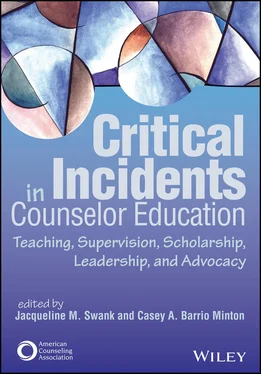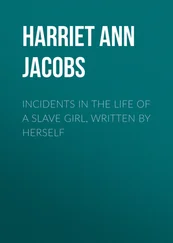Matthew Tirrell, MS, LPC, NCC, ACS,is the director of field placement and an adjunct professor in the Department of Professional Counseling at Monmouth University. His expertise is in counseling people with comorbid disorders and supervising counselors-in-training. His research interests focus on lesbian, gay, bisexual, transgender, queer, and intersex (LGBTQI+) people in recovery and contextual factors in multicultural supervision.
Linwood G. Vereen, PhD, NCC,is an associate professor in the Department of Counseling and College Student Personnel at Shippensburg University of Pennsylvania. His research interests focus on leadership, Black existentialism, group work, and humanistic counseling.
Unity Walker, MEd, NCC,is a doctoral student at the College of William & Mary. Their expertise is in marginalized advocacy, transpersonal issues in counseling, and counselor development. Their research interests focus on marginalized advocacy and transpersonal development.
Richard E. Watts, PhD, LPC-S,is SHSU Distinguished Professor and Texas State University System Regents’ Professor in the Department of Counselor Education at Sam Houston State University. His research interests focus on the integration of Adlerian, cognitive, constructivist, humanistic-existential, and psychodynamic theories and applications in work with individuals, couples, and groups; supervision; education; and leadership. He is also interested in ethical, religious, and spiritual issues related to counseling.
Jo Lauren Weaver, MS, ALC, NCC,is a doctoral student and research assistant at the University of Florida. Her research interests focus on effective treatment modalities for children and adolescents, restorative justice, generational impacts of social media, and creativity in counseling and counselor education.
Jane M. Webber, PhD, LPC,is an assistant professor and doctoral program coordinator at Kean University. Her expertise is in trauma counseling; disaster response; and child, adolescent, and school counseling. Her research interests focus on trauma training and counseling approaches and on trauma-informed supervision.
Kelly L. Wester, PhD, LCMHC, NCC,is a professor at the University of North Carolina at Greensboro. Her expertise and research interests focus on researcher identity and research self-efficacy development and on nonsuicidal self-injury.
Cirecie A. West-Olatunji, PhD,is a professor at Xavier University of Louisiana and a past-president of the American Counseling Association. Her research focuses on the relationship between traumatic stress and systemic oppression.
Kathy Ybañez-Llorente, PhD, LPC-S,is an associate professor at Texas State University. Her expertise is in ethics, multicultural supervision, advocacy, professional leadership and service, and licensure regulation. Her research interests focus on professional identity, clinical supervision, ethics, and licensure regulation.
Section 1 Student Engagement and Dispositions
Section 2 Dynamics Related to Diversity and Inclusion
Section 3 Instructor Preparedness
Counselor educatorsspend more time teaching than in any other role. The 2016 Council for Accreditation of Counseling and Related Educational Programs (CACREP) Standards (CACREP, 2016) specify teaching as a core area, including coverage of a more traditional knowledge base (e.g., models of adult learning) alongside specialty skills for delivering coursework, assessing skills, and addressing problems of professional competence. Likewise, the ACA Code of Ethics (American Counseling Association [ACA], 2014) addresses ethical issues counselor educators may encounter within the classroom, including the importance of self-growth, clear expectations for students, and gatekeeping responsibilities. Furthermore, the Association for Counselor Education and Supervision Teaching Initiative Taskforce (2016) provides Best Practices in Teaching in Counselor Education to guide these processes.
Like many tasks in our complex profession, teaching is about so much more than delivering content and ensuring aspiring counselors have the knowledge to pass licensure examinations. Rather, counselor educators must create environments in which students learn content, establish foundations for complex skills, and cultivate the dispositions they need to succeed. Even in courses with a high level of content, counselor educators require self-growth and awareness exercises, model elements of counseling relationships, and navigate intricate intrapersonal dynamics and interpersonal peer relationships. Furthermore, counselor educators engage these tasks in the context of holistic, professional programs, thus adding a layer of complexity to our teaching tasks. This part of the book encompasses 13 chapters grouped within three primary, although sometimes overlapping, areas: (a) student engagement and dispositions, (b) dynamics related to diversity and inclusion, and (c) instructor preparedness.
Student Engagement and Dispositions
Most counselor educators in graduate, professional programs focused on human relationship and communication expect a level of preparedness and engagement from adult learners in the classroom. A number of issues or situations may lead students to not meet expectations for engagement. Whether in part-time programs in which many students navigate work and family demands or in full-time programs in which they may be deluged with coursework (and also navigate work and family demands), students may manage their workload in ways that impact peers and course processes as a whole. In “I Don’t Have a Clue: Responding to Unprepared or Unengaged Students,” an instructor flounders when students have not read or prepared for class and thus cannot engage the lesson he prepared for them. Next “I Did My Part: Responding to Inequitable Group Project Contributions” features a group member who stops engaging with group members, who initially do her work out of fear for their grade; the instructor must decide how to address this, including considering strategies for balancing both the collaborative group process (an important work skill for any workplace) and the content of the assignment.
Counselor educators also encounter situations in which students intentionally or unintentionally violate the ACA Code of Ethics (ACA, 2014) as part of course experiences. These situations raise critical questions regarding student retention and remediation processes. Instructors must discern how to address concerns related to dispositions or ethical comportment in ways that are developmentally and culturally sensitive yet protect the public. “It’s Not Their Work: A Case of Plagiarism” features an instructor who balances ethics and care when responding to a case of blatant plagiarism, adjusting course materials and processes to prevent future instances. Not all disposition concerns are so clear. In “Too Much Information: Maintaining Boundaries During Skills Practice” a student repeatedly shares her own trauma with peers, even after the instructor sets limits for sharing to help students practice appropriate self-disclosure. Likewise, “I’m a Counselor . . . Well Almost: Boundary Extensions in Service Learning” involves a student who oversteps her bounds of competence and parameters outlined as part of a service-learning engagement, raising questions regarding her self-awareness and willingness to follow supervisory directives.
As is also illustrated in the previous cases, counselor educators have unique responsibilities to help students develop self-awareness, intrapersonal understanding, and interpersonal skills. The ACA Code of Ethics (ACA, 2014) also directly states that “self-growth is an expected component of counselor education” (Standard F.8.c.), noting the importance of ethical principles and allowing students to decide what to share or withhold in class. These responsibilities are further highlighted in the 2016 CACREP Standards (CACREP, 2016) for experiential learning within multicultural counseling coursework and the requirement for at least 10 clock hours as members within a small-group experience. In “I’m Here, I’m Not Participating: Student Resistance to a Group Experience,” an instructor must decide how to address a student, older than many of her peers, who chooses not to engage in small group.
Читать дальше










